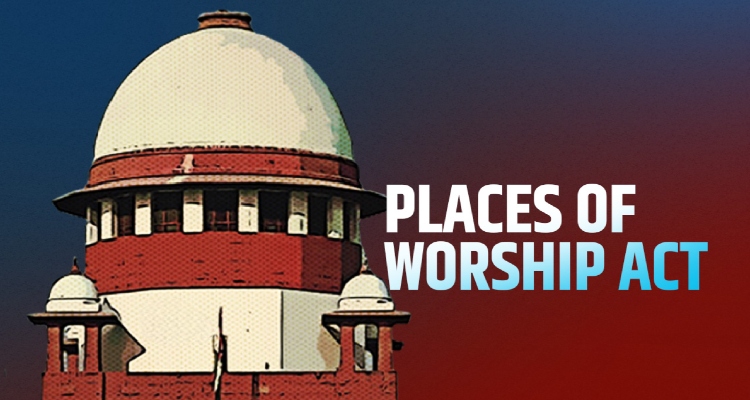
The Supreme Court of India is set to hear a series of petitions on April 1, Tuesday, challenging the constitutional validity of various provisions of the Places of Worship (Special Provisions) Act, 1991.
The petitions, filed by multiple parties, raise significant questions about the legal framework governing religious sites across the country.
Key Issues Under Review
At the center of the legal debate is the Places of Worship (Special Provisions) Act, 1991, which mandates the maintenance of the religious character of any place of worship as it existed on August 15, 1947. This law prohibits the conversion of any religious site and seeks to preserve the status quo, except for the Ayodhya Ram Mandir issue, which was deliberately kept out of the Act’s purview.
The bench, led by Chief Justice Sanjiv Khanna and Justice Sanjay Kumar, will review the petitions challenging the constitutionality of certain provisions. The Court had previously restricted lower courts from registering new cases or passing interim orders related to the Act, effectively putting a hold on related legal proceedings nationwide.
Impact On Ongoing Cases
This judicial intervention has stalled at least 18 lawsuits filed across India. These cases involve disputes over the religious identity of significant sites, including:
- Gyanvapi Mosque In Varanasi
- Shahi Idgah Masjid in Mathura
- Shahi Jama Masjid in Sambhal
The Supreme Court’s directive has created a legal vacuum, delaying the adjudication of these high-profile cases.
Diverging Arguments
The Muslim side, represented by several legal experts and organizations, argues that the petitions challenging the Act should be dismissed. They contend that granting the Hindu side’s requests would have “drastic” consequences, potentially destabilizing the peaceful coexistence of religious communities.
On the other hand, the petitioners represent a diverse spectrum of individuals, including:
- Maharaja Kumari Krishna Priya, daughter of the Kashi royal family
- BJP leader Subramanian Swamy
- Former MP Chintamani Malviya
- Anil Kabotra, retired army officer
- Advocates Chandra Shekhar and Ashwini Upadhyay
- Swami Jeetendranand Saraswati, religious leader
- Devkinandan Thakur Ji, religious guru from Mathura
- Rudra Vikram Singh, a resident of Varanasi
The bench had previously expressed displeasure in February over the increasing number of petitions, remarking that “there should be a limit for intervention applications moved regarding the matter.” This comment reflects the Court’s growing concern over the potential for judicial overreach and the need for a more structured approach.
What’s At Stake?
The Supreme Court’s decision could have far-reaching implications not just for the Places of Worship Act but also for the broader legal landscape regarding religious freedoms, heritage preservation, and communal harmony in India. The outcome may set a precedent for future cases concerning the religious character of historical monuments and places of worship.
As the nation watches closely, the verdict will undoubtedly shape the contours of religious and legal discourse in the country for years to come.
Read More: Supreme Court, Delhi High Court, States High Court, International




